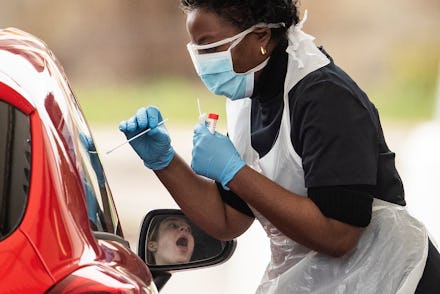Why is the government cutting funding for coronavirus testing?

It's still far too early to say whether the coronavirus pandemic has peaked across America. While there are a number of encouraging signs that widespread social distancing and other precautionary measures may be helping level the number of new COVID-19 cases in some hotspots, experts warn that not only are we not in the clear yet, but that we should in fact brace for a second wave of the virus if we let down our guard too early.
It is in this liminal space between slim optimism and grim resignation that the Trump administration plans to end federal funding for dozens of coronavirus testing sites, prompting local governments to assume full financial responsibility for these vital services — or risk losing the site and its testing capacity entirely.
"I am understandably disappointed that the supplies and federal contract for lab testing is ending just as we are heading into the surge here in southeastern Pennsylvania," Montgomery County Commission chair Dr. Valerie Arkoosh told NPR this week. The county's Temple University: Ambler Campus test site has reportedly conducted 4,000 coronavirus tests, and is set to close on April 10. Mic has reached out to Dr. Arkoosh for comment, and will update this post if she responds.
The Temple campus site is one of 41 testing facilities nationwide that are supplied and funded through the Federal Emergency Management Agency, under its "Community-Based Testing Sites" program. Government officials have been quick to note that many of those sites won't be shuttering entirely, but will instead be "transitioning to state-managed sites on or about April 10," according to statement given to NPR.
Not every community is upset that the program is ending.
"We could have continued [South Philadelphia's Citizens Bank Park CBTS]," Philadelphia Health Commissioner Thomas Farley explained earlier this week, after FEMA decided to close the site. "We felt it actually was better to use the assets we had and distribute them across the many other sites in the city of Philadelphia."
“The remaining test kits, supplies, and other materials will be distributed to these other test sites across the city," Farley continued, "which in turn can increase their capacity for testing."
However, not every local government has the resources that Philadelphia does. This week, Dallas County, Texas, announced that it had negotiated an extension on its federally funded test site through the end of April, rather than having to close Saturday.
"The two drive thru sites at the [American Airlines Center sports arena] and Ellis Davis [Field House] are actually federally based community testing sites, not run by the county," Lauren Trimble, the chief of staff for Dallas County Judge Clay Jenkins, explained to the local CBS affiliate. "Tests from the two sites are sent to private, commercial labs (Quest and Labcorp)."
Despite overwhelming testing demand, which has created considerable backlog for the sites in Dallas, the government's extended contract will keep in place a 250-test-per-day limit, which the county had requested be raised. Mic has reached out to Judge Jenkins' office for comment on the extension.
In a statement to Pennsylvania's WHYY PBS station, FEMA officials stressed that these closures and abrupt funding shifts have been part of the plan for the CBTS program all along.
"The Community-Based Testing Sites (CBTS) program was intended as an immediate high-impact intervention to bring initial testing capabilities to critical areas across the country," the statement explained. "Now that the FDA has given approval for individuals to self-administer COVID-19 nasal swab tests at testing sites, the demand for [personal protective equipment] and trained health care providers will significantly be reduced." Mic has reached out to FEMA for details on the program, and its closure, and will update this post if the agency responds.
Taking a step back, however, the end of federal funding for local testing sites fits nicely within the broader pattern established by the Trump administration to downplay its own role in addressing the pandemic, while putting much of the burden on state and municipal governments instead. Already we've seen the disastrous results of the White House's inability to provide adequate testing in the early stages of the coronavirus outbreak, while health officials warn that without robust continual testing, the pandemic will likely continue apace.